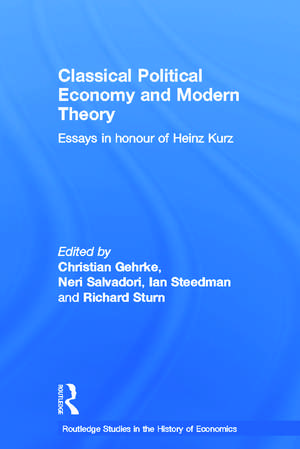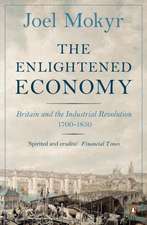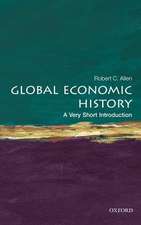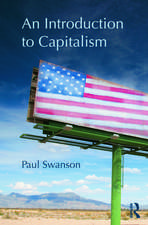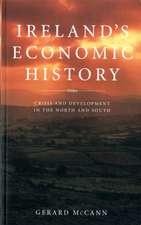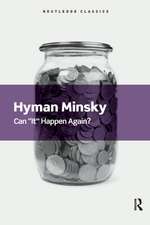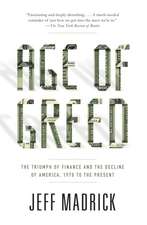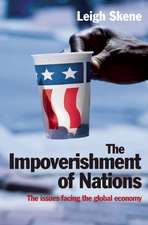Classical Political Economy and Modern Theory: Essays in Honour of Heinz Kurz: Routledge Studies in the History of Economics
Editat de Neri Salvadori, Christian Gehrke, Ian Steedman, Richard Sturnen Limba Engleză Hardback – 26 oct 2011
The essays in this book will be an invaluable source of inspiration for economists interested in economic theory and in the evolution of economic thought. They will also be of interest to postgraduate and research students specialising in economic theory and in the history of economic thought.
Din seria Routledge Studies in the History of Economics
-
 Preț: 378.26 lei
Preț: 378.26 lei -
 Preț: 316.51 lei
Preț: 316.51 lei -
 Preț: 302.55 lei
Preț: 302.55 lei - 9%
 Preț: 1003.12 lei
Preț: 1003.12 lei -
 Preț: 324.46 lei
Preț: 324.46 lei -
 Preț: 311.28 lei
Preț: 311.28 lei -
 Preț: 326.99 lei
Preț: 326.99 lei -
 Preț: 326.82 lei
Preț: 326.82 lei -
 Preț: 665.69 lei
Preț: 665.69 lei - 9%
 Preț: 935.40 lei
Preț: 935.40 lei -
 Preț: 395.82 lei
Preț: 395.82 lei -
 Preț: 280.74 lei
Preț: 280.74 lei -
 Preț: 318.31 lei
Preț: 318.31 lei -
 Preț: 392.72 lei
Preț: 392.72 lei - 8%
 Preț: 392.82 lei
Preț: 392.82 lei -
 Preț: 310.43 lei
Preț: 310.43 lei -
 Preț: 214.15 lei
Preț: 214.15 lei -
 Preț: 399.71 lei
Preț: 399.71 lei -
 Preț: 157.37 lei
Preț: 157.37 lei - 26%
 Preț: 850.91 lei
Preț: 850.91 lei - 27%
 Preț: 995.39 lei
Preț: 995.39 lei - 18%
 Preț: 1005.04 lei
Preț: 1005.04 lei - 18%
 Preț: 1002.60 lei
Preț: 1002.60 lei - 28%
 Preț: 1046.46 lei
Preț: 1046.46 lei - 18%
 Preț: 1280.31 lei
Preț: 1280.31 lei - 18%
 Preț: 1055.51 lei
Preț: 1055.51 lei - 18%
 Preț: 1055.51 lei
Preț: 1055.51 lei - 28%
 Preț: 987.72 lei
Preț: 987.72 lei - 25%
 Preț: 824.17 lei
Preț: 824.17 lei - 18%
 Preț: 1061.93 lei
Preț: 1061.93 lei - 18%
 Preț: 716.32 lei
Preț: 716.32 lei - 18%
 Preț: 1006.07 lei
Preț: 1006.07 lei - 18%
 Preț: 1069.92 lei
Preț: 1069.92 lei - 12%
 Preț: 342.67 lei
Preț: 342.67 lei - 18%
 Preț: 1056.00 lei
Preț: 1056.00 lei - 28%
 Preț: 991.34 lei
Preț: 991.34 lei - 18%
 Preț: 1076.53 lei
Preț: 1076.53 lei - 18%
 Preț: 698.08 lei
Preț: 698.08 lei - 22%
 Preț: 332.02 lei
Preț: 332.02 lei - 18%
 Preț: 1169.78 lei
Preț: 1169.78 lei - 18%
 Preț: 1059.84 lei
Preț: 1059.84 lei - 30%
 Preț: 852.88 lei
Preț: 852.88 lei - 25%
 Preț: 830.10 lei
Preț: 830.10 lei - 18%
 Preț: 1119.93 lei
Preț: 1119.93 lei - 18%
 Preț: 1062.98 lei
Preț: 1062.98 lei - 18%
 Preț: 953.01 lei
Preț: 953.01 lei
Preț: 1064.98 lei
Preț vechi: 1298.76 lei
-18% Nou
Puncte Express: 1597
Preț estimativ în valută:
203.77€ • 212.78$ • 168.28£
203.77€ • 212.78$ • 168.28£
Carte tipărită la comandă
Livrare economică 15-29 aprilie
Preluare comenzi: 021 569.72.76
Specificații
ISBN-13: 9780415679817
ISBN-10: 0415679818
Pagini: 416
Ilustrații: 18 line drawings
Dimensiuni: 156 x 234 x 28 mm
Greutate: 0.75 kg
Ediția:1
Editura: Taylor & Francis
Colecția Routledge
Seria Routledge Studies in the History of Economics
Locul publicării:Oxford, United Kingdom
ISBN-10: 0415679818
Pagini: 416
Ilustrații: 18 line drawings
Dimensiuni: 156 x 234 x 28 mm
Greutate: 0.75 kg
Ediția:1
Editura: Taylor & Francis
Colecția Routledge
Seria Routledge Studies in the History of Economics
Locul publicării:Oxford, United Kingdom
Public țintă
Postgraduate and UndergraduateCuprins
1. Introduction Ian Steedman and Richard Sturn Part 1: Political Economy and its Critique 2. Two Concepts of Regulation: Just Prices and the Limits of Pure Economics Richard Sturn 3. Natural Law and the Existence and Optimality of Political Equilibrium John S. Chipman 4. Marx’s Critique of Ricardo’s Theory of Rent: A Re-Assessment Christian Gehrke 5. ‘Neoricardian Theory’ versus Marxian Theory? A Note Pierangelo Garegnani 6. The Empirical Linearity of Sraffa's Critical Output-Capital Ratios Anwar ShaikH Part 2: Entrepreneurship, Evolution and Income Distribution 7. Entrepreneurship, Risk and Income Distribution in Cantillon’s Essay Tony Aspromourgos 8. Economic Development and Income Distribution: Schumpeter and the Institutionalist Heritage Richard Arena and Alain Raybaut 9. Was Schumpeter Walrasian? Mark Knell 10. Investment and the Evolutionary Theory of Competition J. Stanley Metcalfe Part 3: Cambridge, Keynes and Macroeconomics 11. The "Elusive Figure Who Hides in the Preface of Cambridge books": An Appraisal of Richard Kahn’s Contributions Maria Cristina Marcuzzo 12. A Patchwork Post-Keynesian/Evolutionary Approach to Income Distribution Alessandro Roncaglia 13. Some Notes about the Relation Between the Distribution of Income and the Distribution of Property Peter Kalmbach 14. Transformational Growth: From a Marshallian Neoclassical System to Keynesian Growth Edward J. Nell 15. On the Concepts of Period and Run in Economic Theory Geoffrey Harcourt 15. Old Swedes on Money and Capital Hans-Michael Trautwein Part 4: Crisis and Cycles 17. Graphical Representations of Overstone’s Cycle of Trade Daniele Besomi 18. Economics in an Age of Crisis: Lessons from the Past and from the Present Jose Luis Cardoso 19. Cantillon Revisited Antoin Murphy Part 5: Personal Reminiscences 20. The Privilege of the First, or: Why Does Research Work make Heinz Happy? Hagen Krämer 21. Sraffa at Kiel Harald Hagemann. Heinz Kurz's Publications
Notă biografică
Ian Steedman, Neri Salvadori, Christian Gehrke, Richard Sturn
Descriere
Classical Political Economy and Modern Theory comprises twenty essays, grouped thematically into five sections. Part 1 examines political economy and its critique, Part 2 looks at entrepreneurship, evolution and income distribution, Part 3 discusses Cambridge, Keynes and macroeconomics, Part 4 explores crisis and cycles, whilst Part 5 is dedicated to personal reminiscences.
